
FDA Approves Bendamustine to Treat Relapsed Indolent Non-Hodgkin Lymphoma
Cephalon, Inc, announced that the US Food and Drug Administration (FDA) has approved injectable bendamustine hydrochloride (Treanda) for the treatment of patients with indolent B-cell non-Hodgkin lymphoma (NHL) that has progressed during or within 6 months of treatment with rituximab (Rituxan) or a rituximab-containing regimen. The data supporting the FDA approval show that bendamustine is effective, has a tolerable side effect profile in patients with indolent NHL, and that treatment results in a high durable response rate. In March of this year, bendamustine received approval for the treatment of patients with chronic lymphocytic leukemia, the most common form of leukemia in the United States.
Cephalon, Inc, announced that the US Food and Drug Administration (FDA) has approved injectable bendamustine hydrochloride (Treanda) for the treatment of patients with indolent B-cell non-Hodgkin lymphoma (NHL) that has progressed during or within 6 months of treatment with rituximab (Rituxan) or a rituximab-containing regimen. The data supporting the FDA approval show that bendamustine is effective, has a tolerable side effect profile in patients with indolent NHL, and that treatment results in a high durable response rate. In March of this year, bendamustine received approval for the treatment of patients with chronic lymphocytic leukemia, the most common form of leukemia in the United States.
“Because most patients with indolent non-Hodgkin lymphoma eventually become resistant to existing treatments, new treatment options like Treanda are needed to improve patient outcome,” stated Dr. Bruce Cheson, professor of medicine at Georgetown University Hospital, Washington, DC, and bendamustine clinical investigator. “The Treanda pivotal trial shows that it is an effective and well-tolerated chemotherapy that offers a delay in disease progression for more than 9 months.”
Pivotal Trial
The FDA approval is supported by a pivotal trial of 100 patients with indolent B-cell NHL who had progressed during or within 6 months of treatment with a regimen that included rituximab. The pivotal study demonstrated that patients had a high response rate to treatment with bendamustine, and these responses to the treatment were durable. The results from the pivotal study showed that treatment with bendamustine as a single agent resulted in an overall response rate of 74%. Additionally, patient response to treatment in the pivotal study lasted a median of 9.2 months and patients remained alive and their disease did not progress for a median of 9.3 months.
The safety of bendamustine is also supported by a secondary monotherapy study. In the pivotal and secondary studies for bendamustine in indolent NHL, the most common nonhematologic adverse reactions are nausea, fatigue, vomiting, diarrhea, pyrexia, constipation, anorexia, cough, headache, weight decrease, dyspnea, rash, and stomatitis. The most common hematologic abnormalities are lymphopenia, leukopenia, anemia, thrombocytopenia, and neutropenia.
Newsletter
Stay up to date on recent advances in the multidisciplinary approach to cancer.












































